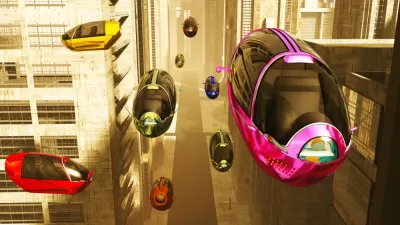Walker contemplates the implications of the science fiction staple that continues to fascinate and engage writers and technologists.

Musing on a tweet by Scott Edgar that asserts that "a sizeable share of contemporary science fiction is really just bad faith rationales for not building bus lanes," Jarrett Walker examines the concept of flying cars in Ada Palmer's "Terra Ignota" books, which take place in "a 25th Century world where automated flying Uber has crushed all other modes of transport, creating a dreaded concentration of monopoly power from which flow the crises that drive the plot."
In the books, conflicts are resolved by a system of "neutral justice." But, Jarrett writes, "a city that functions (rather than just symbolizes) needs a much finer shared web of legal and cultural systems. There must still be rules about where you can land a flying car, or what you can throw in a sewer drain that goes to the local river, or whether you can build a factory next to people’s homes. In the absence of such rules, we must imagine the libertarian urban world that the unrestrained flying car would make."
Jarrett questions whether "we should want to 'abolish geography', as so many transport gadget inventors have promised over the years," and how it would affect our conception of citizenship and civic engagement. "[I]n a world of such universal travel, [have] all these places become so identical that you might as well work from home?" In "a placeless society where you and your neighbor listen to different news sources to the point that you have incompatible views about reality," "would you still be able to cooperate about fixing the fence or agreeing on quiet hours?"
FULL STORY: Where Flying Cars Take Us: A Science Fiction Excursion

Maui's Vacation Rental Debate Turns Ugly
Verbal attacks, misinformation campaigns and fistfights plague a high-stakes debate to convert thousands of vacation rentals into long-term housing.

Planetizen Federal Action Tracker
A weekly monitor of how Trump’s orders and actions are impacting planners and planning in America.

In Urban Planning, AI Prompting Could be the New Design Thinking
Creativity has long been key to great urban design. What if we see AI as our new creative partner?

King County Supportive Housing Program Offers Hope for Unhoused Residents
The county is taking a ‘Housing First’ approach that prioritizes getting people into housing, then offering wraparound supportive services.

Researchers Use AI to Get Clearer Picture of US Housing
Analysts are using artificial intelligence to supercharge their research by allowing them to comb through data faster. Though these AI tools can be error prone, they save time and housing researchers are optimistic about the future.

Making Shared Micromobility More Inclusive
Cities and shared mobility system operators can do more to include people with disabilities in planning and operations, per a new report.
Urban Design for Planners 1: Software Tools
This six-course series explores essential urban design concepts using open source software and equips planners with the tools they need to participate fully in the urban design process.
Planning for Universal Design
Learn the tools for implementing Universal Design in planning regulations.
planning NEXT
Appalachian Highlands Housing Partners
Mpact (founded as Rail~Volution)
City of Camden Redevelopment Agency
City of Astoria
City of Portland
City of Laramie





























